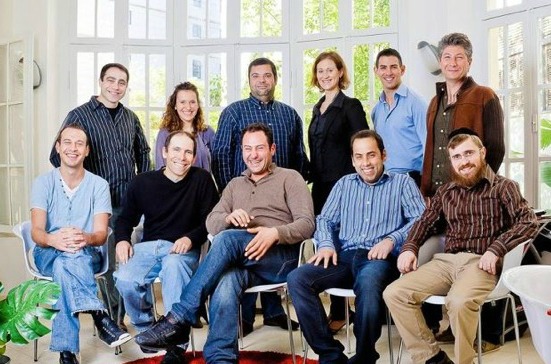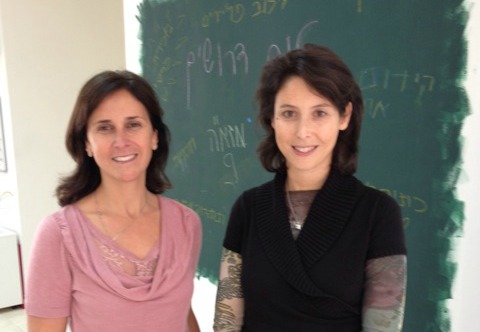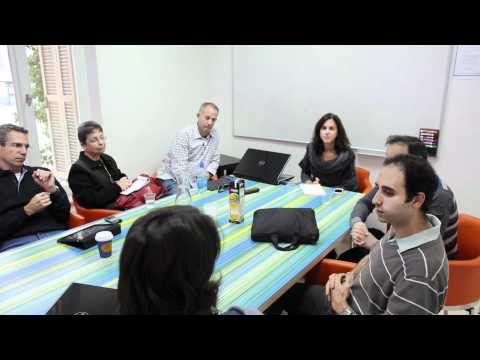
The successful Israeli high-tech startup model is well established since the late 1990s: Young engineers conceive an idea, take it to investors, and — if they luck out — sell a new multi-million-dollar product to a large search engine or telecom company.
But what about immigrants? How do they integrate into the startup scene when they move to Israel? Without the advantage of the army and its personal networks, new arrivals — even those with impressive education and experience — don’t have equal access to the startup scene.
That’s about to change, thanks to some busy bees at Gvahim (“Heights”) Entrepreneurs, a non-profit employment organization in Tel Aviv.
A new Gvahim program, TheHive, aims to accelerate new immigrants’ startups, and to use their resources to further enhance Israeli startups, too.
Armed with degrees, marketing experience and a working knowledge of international markets, newly minted Israelis from the Ukraine, the United States, France and beyond are heading eight new startup companies at TheHive, a shared workspace that shapes collaborative development.
A supportive cocoon
TheHive is co-directed by two French immigrants to Israel, Audrey Chocron and Cynthia Phitoussi. These two go-getters approached Gvahim a year and a half ago to propose a six-month startup accelerator giving new immigrants to Israel the same advantages as Israelis who went to the army and to university in the startup nation.
The choice of the name is meant not only to conjure images of Israel as the land of milk and honey, says Chocron, but also high productivity. “Bees share the same values, working in community, and are very efficient,” she points out.
The idea is to pair up one immigrant with one native Israeli mentor.

“This is what we stated from the beginning,” Chocron tells ISRAEL21c. “Olim [new immigrants to Israel] can bring to Israel something very good, and complement what Israel has already. Being good at technology, the knowledge of the market in their land — the US, the UK, Europe — this way of thinking from abroad can bring a lot to Israelis who want to export to the US.”
While TheHive doesn’t finance the young companies — in fact, start-ups pay a small fee to join — the non-profit Gvahim does not take a share in the companies’ eventual profits, either.
Chocron says the program wraps new immigrants in a support cocoon, introducing them to top specialists in Israel and giving them tools for everything from search engine optimization to giving presentations. When the time is ripe, handholding is available at meetings with potential investors.
Companies to watch
It’s not easy for doctors, lawyers, CEOs or professors to find the same opportunities in Israel as they had back home, due to the language and cultural barrier.
Tel Aviv-based Gvahim, founded in 2006 by the Rashi Foundation with Israeli businessmen and the support of two French university alumni associations, helps new immigrants find appropriate jobs in Israel to match their skill sets. Headed by Yair Shamir, chairman of Israel Aerospace Industries, Gvahim runs a career development program and helps new immigrants market themselves competitively.
At TheHive, candidates will network and learn the startup ropes directly from people like Rina Pridor, founder and former director of the government’s Technological Incubators Program; Eran Goren, the co-founder of Fidelis Family Office; and Moshe Mor, a partner at Greylock Venture Capital.
The incubating companies in TheHive include Koola Ring (French-American), a company that creates collaborative services for alumni networks; Parko (South African-Israeli), a company making an app to locate parking spots in busy cities; PaperJet (South African-Colombian), which offers students free document printing by placing promotions on the back of the printed pages; Taptank (Israeli-American) a personal and social productivity tool; Agilite (British-American), a manufacturer of tactical gear for military, law enforcement and security professionals; Quikbreak (American), a mobile site featuring quality web shows and games for the over-30 crowd; YadWire (Italian-French), which seeks to monetize free surfing for Wi-Fi operators and public venues; and EZ Life (French-Israeli), which will offer greener modes of short-distance transport.













